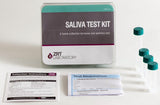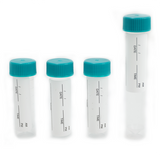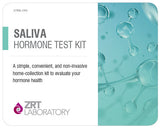Male Saliva Steroid LC-MS Hormone Profile 7 – Advanced At-Home Hormone Test for Men
The Male Saliva Steroid LC-MS Hormone Profile 7 is an advanced at-home hormone test for men that measures seven essential hormones using Liquid Chromatography–Mass Spectrometry (LC-MS/MS), the gold-standard laboratory technique for high-precision hormone analysis. This test provides a clear and accurate picture of your hormonal health — including testosterone, DHEAS, progesterone, cortisol, and key estrogens — all from a simple saliva sample collected at home.
What the Test Measures
This profile evaluates seven critical hormones affecting men’s energy, mood, fertility, muscle strength, and stress response:
- Testosterone (T): The main male hormone that supports muscle growth, bone density, libido, and vitality.
- DHEAS (DS): An adrenal hormone that converts into testosterone and estrogen, reflecting overall hormonal balance.
- Progesterone (Pg): Plays a role in mood, brain function, and counterbalancing estrogen effects in men.
- Cortisol (C): The “stress hormone” that regulates metabolism, immune response, and energy.
- Estrone (E1): A type of estrogen involved in bone and cardiovascular health.
- Estradiol (E2): The most active form of estrogen, essential for sexual and brain health in men.
- Estriol (E3): A weaker form of estrogen, valuable for understanding overall estrogenic activity.
- How and when to Collect your saliva samples: Saliva Testing Instructions
- Click to see >> Sample Saliva Test Result Report
Key Features
- Accurate LC-MS/MS Technology: Ensures high sensitivity and precision for detecting even low hormone concentrations.
- Comprehensive 7-Hormone Profile: Covers both male and adrenal hormones for a complete health assessment.
- At-Home Collection: Collect your saliva sample in minutes with the easy-to-use kit — no clinic visit required.
- Fast Results: Receive your detailed hormone report within 3–5 working days after the lab receives your sample.
- Expert Analysis: Includes PhD Hormone Specialist commentary and personalized guidance for optimal hormonal health.
- Actionable Insights: Identify deficiencies or excesses early to support better energy, mood, fertility, and stress management.
- Transparent Pricing: All lab fees included. No hidden charges — you only pay for shipping your sample.
- Confidential and Convenient: 100% private, non-invasive, and suitable for men of all ages.
Why Choose Saliva Testing?
- Non-Invasive: No needles or blood draws — just a simple saliva sample.
- Bioavailable Hormone Measurement: Accurately measures the active (unbound) hormones that affect how you feel.
- At-Home Collection: Easy sample collection at specific times for the most accurate results.
- Reliable for Monitoring Therapy: Ideal for tracking progress during hormone replacement or testosterone therapy.
What Your Results Include
- Graphical and numerical hormone values for clear interpretation
- PhD-level hormone specialist review and comments
- Personalized recommendations to restore and maintain optimal balance
Who Should Take This Test
This test is ideal for men who experience:
- Fatigue or low energy
- Decreased libido or erectile issues
- Weight gain or muscle loss
- Sleep problems or mood swings
- Stress or anxiety
- Hot flushes or night sweats
- Difficulty focusing or brain fog
How It Works
- Order Online: Choose your test and receive your kit at home.
- Collect Samples: Follow the step-by-step saliva collection instructions.
- Send to Lab: Mail your sample using the secure return envelope.
- Receive Results: Get your expert-reviewed report within 3–5 working days.
FAQ – Male Saliva Steroid LC-MS Hormone Profile 7
1. What does this test measure?
It measures seven key male hormones — testosterone, DHEAS, progesterone, cortisol, estrone, estradiol, and estriol — using LC-MS/MS for high accuracy.
2. What is LC-MS/MS?
It stands for Liquid Chromatography–Tandem Mass Spectrometry, a precise lab method that detects even very low hormone levels. (LCMS could refer to Liquid Chromatography Mass Spectrometry, an analytical chemistry technique that identifies and measures large non-volatile samples. LCMS/MS, or Liquid Chromatography-tandem Mass Spectrometry, has grown significantly in clinical laboratories over the past 15 years.)
3. Who should take this test?
Men with fatigue, low libido, mood changes, stress, weight gain, or suspected hormonal imbalance.
4. How do I collect the sample?
Collect saliva at home using the provided kit and send it to our certified lab following the included instructions.
5. How long until I get results?
Results are ready within 3–5 working days after your sample arrives at the lab.
6. What’s included in my results?
Graphical and numerical hormone values plus expert analysis and recommendations from a PhD Hormone Specialist.
7. Are there any extra fees?
No hidden charges — the lab fee is included. You only pay for sample postage.
8. Is the test suitable for all ages?
Yes, it’s suitable for adult men and adolescents under clinical supervision.
9. Why choose saliva testing?
It’s non-invasive, convenient, and measures bioavailable (active) hormones — the ones that truly affect how you feel.
10. Why choose Hormone Lab UK (ZRT Lab)?
Accurate LC-MS/MS testing, fast turnaround, professional interpretation, and complete privacy
How to Use










